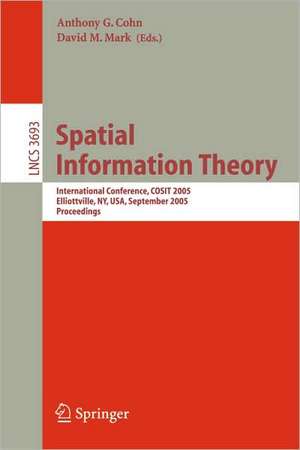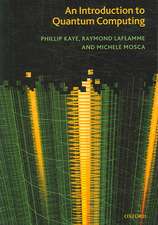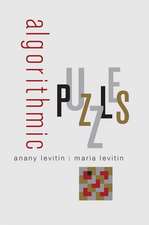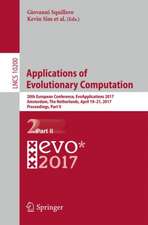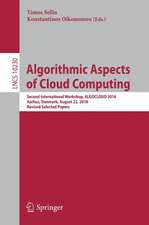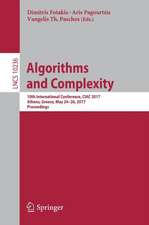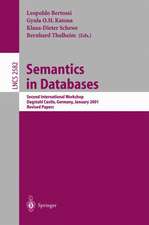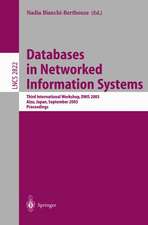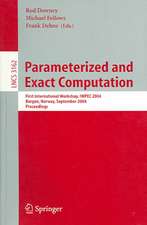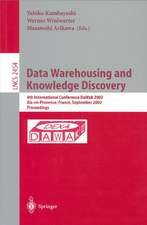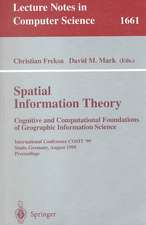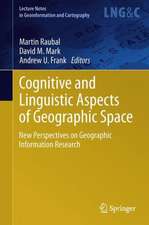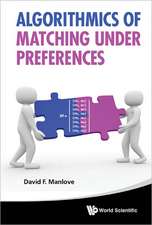Spatial Information Theory: International Conference, COSIT 2005, Ellicottville, NY, USA, September 14-18, 2005, Proceedings: Lecture Notes in Computer Science, cartea 3693
Editat de Anthony G. Cohn, David M. Marken Limba Engleză Paperback – sep 2005
Din seria Lecture Notes in Computer Science
- 20%
 Preț: 1061.55 lei
Preț: 1061.55 lei - 20%
 Preț: 307.71 lei
Preț: 307.71 lei - 20%
 Preț: 438.69 lei
Preț: 438.69 lei - 20%
 Preț: 579.30 lei
Preț: 579.30 lei -
 Preț: 410.88 lei
Preț: 410.88 lei - 17%
 Preț: 427.22 lei
Preț: 427.22 lei - 20%
 Preț: 596.46 lei
Preț: 596.46 lei - 15%
 Preț: 448.04 lei
Preț: 448.04 lei - 20%
 Preț: 353.50 lei
Preț: 353.50 lei -
 Preț: 389.49 lei
Preț: 389.49 lei - 20%
 Preț: 309.90 lei
Preț: 309.90 lei - 20%
 Preț: 645.28 lei
Preț: 645.28 lei - 20%
 Preț: 763.23 lei
Preț: 763.23 lei - 15%
 Preț: 580.46 lei
Preț: 580.46 lei - 20%
 Preț: 310.28 lei
Preț: 310.28 lei - 20%
 Preț: 655.02 lei
Preț: 655.02 lei - 20%
 Preț: 1183.14 lei
Preț: 1183.14 lei - 20%
 Preț: 340.32 lei
Preț: 340.32 lei -
 Preț: 449.57 lei
Preț: 449.57 lei - 20%
 Preț: 591.51 lei
Preț: 591.51 lei - 18%
 Preț: 938.83 lei
Preț: 938.83 lei - 20%
 Preț: 337.00 lei
Preț: 337.00 lei - 20%
 Preț: 649.50 lei
Preț: 649.50 lei - 20%
 Preț: 607.40 lei
Preț: 607.40 lei - 20%
 Preț: 1414.79 lei
Preț: 1414.79 lei - 20%
 Preț: 1024.44 lei
Preț: 1024.44 lei - 20%
 Preț: 583.40 lei
Preț: 583.40 lei - 20%
 Preț: 453.32 lei
Preț: 453.32 lei - 20%
 Preț: 575.49 lei
Preț: 575.49 lei - 20%
 Preț: 1075.26 lei
Preț: 1075.26 lei - 20%
 Preț: 585.88 lei
Preț: 585.88 lei - 20%
 Preț: 825.93 lei
Preț: 825.93 lei - 17%
 Preț: 360.20 lei
Preț: 360.20 lei - 20%
 Preț: 763.23 lei
Preț: 763.23 lei - 20%
 Preț: 340.32 lei
Preț: 340.32 lei - 20%
 Preț: 504.58 lei
Preț: 504.58 lei - 20%
 Preț: 369.13 lei
Preț: 369.13 lei - 20%
 Preț: 580.93 lei
Preț: 580.93 lei - 20%
 Preț: 343.62 lei
Preț: 343.62 lei - 20%
 Preț: 350.21 lei
Preț: 350.21 lei - 20%
 Preț: 583.40 lei
Preț: 583.40 lei - 20%
 Preț: 583.40 lei
Preț: 583.40 lei - 15%
 Preț: 438.59 lei
Preț: 438.59 lei - 20%
 Preț: 341.95 lei
Preț: 341.95 lei - 20%
 Preț: 238.01 lei
Preț: 238.01 lei - 20%
 Preț: 538.30 lei
Preț: 538.30 lei
Preț: 344.60 lei
Preț vechi: 430.75 lei
-20% Nou
Puncte Express: 517
Preț estimativ în valută:
65.94€ • 69.21$ • 54.73£
65.94€ • 69.21$ • 54.73£
Carte tipărită la comandă
Livrare economică 11-25 aprilie
Preluare comenzi: 021 569.72.76
Specificații
ISBN-13: 9783540289647
ISBN-10: 354028964X
Pagini: 512
Ilustrații: XII, 500 p.
Dimensiuni: 155 x 235 x 27 mm
Greutate: 0.75 kg
Ediția:2005
Editura: Springer Berlin, Heidelberg
Colecția Springer
Seriile Lecture Notes in Computer Science, Information Systems and Applications, incl. Internet/Web, and HCI
Locul publicării:Berlin, Heidelberg, Germany
ISBN-10: 354028964X
Pagini: 512
Ilustrații: XII, 500 p.
Dimensiuni: 155 x 235 x 27 mm
Greutate: 0.75 kg
Ediția:2005
Editura: Springer Berlin, Heidelberg
Colecția Springer
Seriile Lecture Notes in Computer Science, Information Systems and Applications, incl. Internet/Web, and HCI
Locul publicării:Berlin, Heidelberg, Germany
Public țintă
ResearchCuprins
Vagueness, Uncertainty, and Gradation.- Anchoring: A New Approach to Handling Indeterminate Location in GIS.- Gradation and Map Analysis in Area-Class Maps.- Simulation of Obfuscation and Negotiation for Location Privacy.- Paths and Routes.- Investigating the Need for Eliminatory Constraints in the User Interface of Bicycle Route Planners.- Path Memory in Real-World and Virtual Settings.- Shortest Path Search from a Physical Perspective.- Ontology and Semantics.- Operationalising ‘Sense of Place’ as a Cognitive Operator for Semantics in Place-Based Ontologies.- Data-Driven Matching of Geospatial Schemas.- The Role of Spatial Relations in Automating the Semantic Annotation of Geodata.- Ontology and Spatial Relations.- Anatomical Information Science.- Matching Names and Definitions of Topological Operators.- Spatial Relations Between Classes of Individuals.- Spatial Reasoning.- Casl Specifications of Qualitative Calculi.- A Spatial Form of Diversity.- Structure and Semantics of Arrow Diagrams.- Cognitive Maps and Spatial Reasoning.- Cognitive Maps Are over 60.- Categorical Methods in Qualitative Reasoning: The Case for Weak Representations.- On Internal Cardinal Direction Relations.- Time, Change, and Dynamics.- Dynamic Collectives and Their Collective Dynamics.- A Linguistics-Based Framework for Modeling Spatio-temporal Occurrences and Purposive Change.- Ordering Events for Dynamic Geospatial Domains.- Landmarks and Navigation.- Structural Salience of Landmarks for Route Directions.- Expert and Non-expert Knowledge of Loosely Structured Environments.- Landmark Extraction: A Web Mining Approach.- Geographic Information.- Satellite Images – A Source for Social Scientists? On Handling Multiple Conceptualisations of Space in Geographical Information Systems.- 3DTopographic Data Modelling: Why Rigidity Is Preferable to Pragmatism.- Morse-Smale Decompositions for Modeling Terrain Knowledge.- Spatial Behavior.- 2D-3D MultiAgent GeoSimulation with Knowledge-Based Agents of Customers’ Shopping Behavior in a Shopping Mall.- Memory for Spatial Location: Influences of Environmental Cues and Task Field Rotation.- Network and Psychological Effects in Urban Movement.- Abstracts of Keynote Talks.- Probabilistic Techniques for Mobile Robot Navigation.- Spatial Language, Spatial Thought: Parallels in Path Structure.
